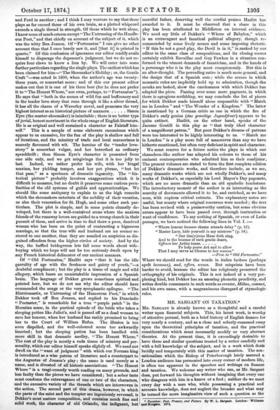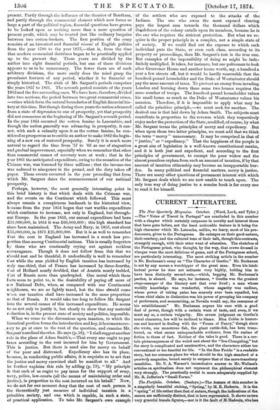MR. SARGANT ON TAXATION.*
MR. SARGANT is already known as a thoughtful and a careful writer upon financial subjects. This, his latest work, is worthy of attentive perusal, both as a brief history of English finance for very nearly a century, and as a close and soberly-reasoned essay upon the theoretical principles of taxation, and the practical considerations which must necessarily modify or vary abstract theories. At the present time, it is exceedingly desirable to have these and similar questions treated by a writer candidly and with a full knowledge of the subject, and in a work which deals lucidly and temperately with this matter of taxation. The sen- sationalism which the Bishop of Peterborough lately assured a London audience has permeated into every corner of modern life, is often too apparent in the speeches and writings on finance and taxation. We welcome any writer who can, as Mr. Sargent does, put forward his thoughts without imagining that every one who disagrees with him is a knave or a fool ; neither do we meet every day with a man who, while possessing a practical and accurate knowledge, does not neglect the broader and what may be termed the more imaginative view of such a question as the • Taratioa: Past, Present, and Mare. By W. L. Elargant. London : Williams and Norgato. 1874. present. Partly through, the influence of the theories of Bentham, and partly through the commercial element which now forms so large a part of the.political region, financial que,stions have grown to be looked upon as nothing more than a mere question of present profit, which may be treated just like ordinary bargains between two cotton-brokers. The first portion of the essay consists of an historical and financial• theme of English politics from the year 1780 to the year 1873,—that is, from the time that modern economical doCtrines began to be practically applied up to the present day. These years are divided by the author into eight financial periods, but one of these divisions appears to us to be unnecessary. The fewer there are of such arbitrary divisions, the more easily does the mind grasp the prominent features of any period, whether it be financial or simply historical. The sixth of. Mr. Sargant's periods comprises the years 1857 to 1861. The seventh period consists of the years 1862 and the five succeeding ones. We have here, therefore, divided into two sections, the period between two great commercial crises, —crises which form the natural boundaries of English financial his- tory at this time. But though during these years the nation advanced from a state of depression to one of prosperity, yet that prosperity did not commence at the beginning of Mr. Sargant's seventh period. In the year 1864 occurred the cotton, famine in Lancashire, and though the nation generally was advancing in prosperity, it can- not, with such a calamity upon it as the cotton famine, be con- sidered so prosperous as to entitle an author to make 1862 the begin- ning of anew era of restored prosperity. Surely it is much more natural to regard the time from '57 to '66 as one of stagnation and gradual improvement, especially when we remember that other than commercial causes of recovery were at work ; that in the year 1861 the anticipated expenditure, owing to the cessation of the Chinese war, was lessened by three millions ; that the income-tax was reduced to ninepence in the pound, and the duty taken off paper. These events occurred in the year preceding that from which Mr. Sargent dates the commencement of our national prosperity.
Perhaps, however,' the most generally interesting point in this brief history is that which deals with the Crimean war, and the events on the Continent which followed. This must always remain a conspicuous landmark in the historical view, because from the year 1854 began that vast warlike expenditure which continues to increase, not only in England, but through- out Europe. In the year 1853, our annual expenditure had been 151,000,000, in 1854 it was £66,000,000 ; this high standard has since been maintained. The Army and Navy, in 1853, cost about £15,000,000, in 1873 £25,000,000. But it is as well to remember that the cost in England has increased in a much less pro- portion than among Continental nations. This is usually forgotten by those who are continually crying out against reckless extravagance. Though it does not follow from this that we should rest and be thankful, it undoubtedly is well to remember t'iat while the sum yielded by English taxation has increased by only one-third, that of France has increased by three-fourths, t'iat of Holland nearly doubled, that of Austria, nearly trebled, t'iat of Russia more than quadrupled. One moral which, these bets seem to point to, is the desirability of paying off more of o it National Debt, when, as compared with our Continental neighbours, we are so lightly taxed, lest the time should come when our taxation shall have increased in the same proportion as that of Russia. It would take too long to follow Mr. Sargent into the several causes of this increased expenditure. He seems to us not only to justify it, but clearly to show that any material reduction is, in the present state of society and politics, impossible.
When we come to the discussions upon taxation, to which the historical portion forms the introduction and key, it becomesneces- suy to go at once to the root of the question, and examine Mr. Sargant's cardinal theories. He says (p. 58), " I shall suggest another rule in the place of Adam Smith's,—That every one ought to pay taxes according to the cost incurred for him by Government. This is justice. But there is need also for mercy on behalf of the poor and distressed. Expediency also has its place, because, in conducting public affairs, it is requisite so to act that the justice and mercy exercised shall be manifest to all." And he further explains this rule by adding (p. 73), " My principle is that each of us ought to pay taxes for the support of army, navy, police, law-courts (all the means of maintaining order and justice), in proportion to the cost incurred on his behalf." Now, we do not for one moment deny- that the cost of each person is the theoretically just measure of individual taxation in a primitive society, and one which is capable, in such a state, of practical application, To take Mr. Sargant's own example
of the settlers who are exposed to the attacks of the Indians. The one who owns the most exposed clearing pays the largest sum towards the thousand dollars which thodefence of the colony- entails upon its members, because he is the one who requires the strictest protection. But what we re- quire is the proper principle in a complex, not a simple state of of society. If we could find out the expense to which each individual puts the State, or even each class, according to its property or proceedings, then Mr. Sargent's teat is the true one.. But examples of the impossibility of doing so might be - inde, finitely multiplied. It takes, for instance, but one policeman to look, after Grosvenor House and another house worth, say, a hundreda year a few streets off, but it would be hardly reasonable that the. hundred-pound householder and the Duke of Westminster should pay the same amount of taxes. To prevent an enemy from invading London and burning down these same two houses requires the same number of troops. The hundred-pound householder values his small house as much as the Duke of Westminster values his mansion. Therefore, if it is impossible to apply what may be called the primitive principle,—we must seek for another. The. desired one is that laid down by Adam Smith. The subjects must contribute in proportion to the, revenue which they respectively enjoy under the.protection,of the State„modified, of course, by what
Sargent terms the principles of mercy and expediency. But when upon these two latter principles, we must add that we think. the term " mercy " unnecessary. It may be comprised.in that of " justice," or expediency." That the happiness of the people is a great aim, of -legislation is a well-known constitutional maxim, and it is both just and expedient, and according to the first principles of government, to exempt the poor widow and the almost penniless orphan from such an amount of taxation, if by that amount of taxation citizenship may become an insupportable bur- den. In many political and financial matters, mercy is justice._ There are many other questions of permanent interest:with which Mr. Sargent deals which we are now unable to touch upon, The only true way of doing justice to a concise book is for every one to read it for himself.



































 Previous page
Previous page